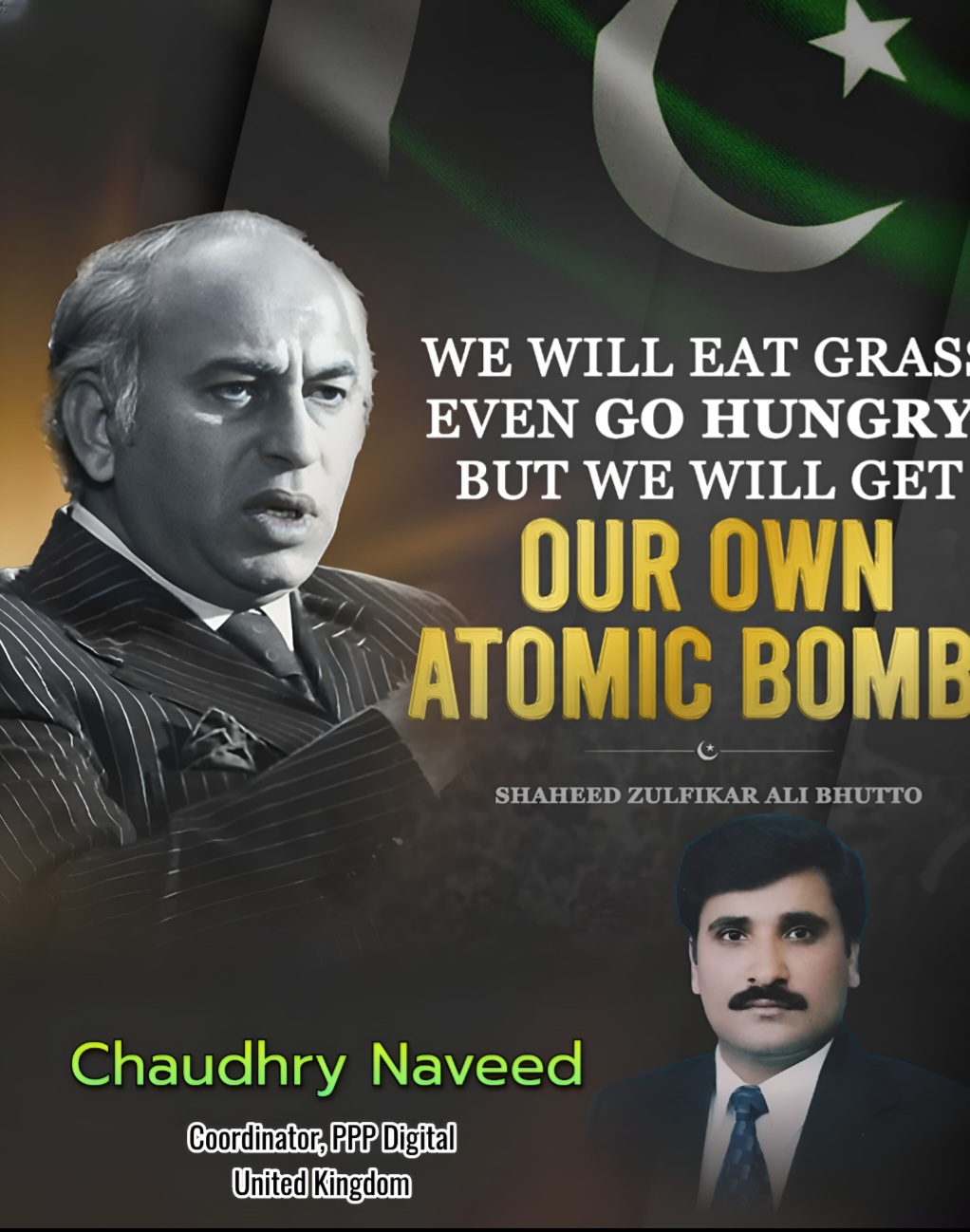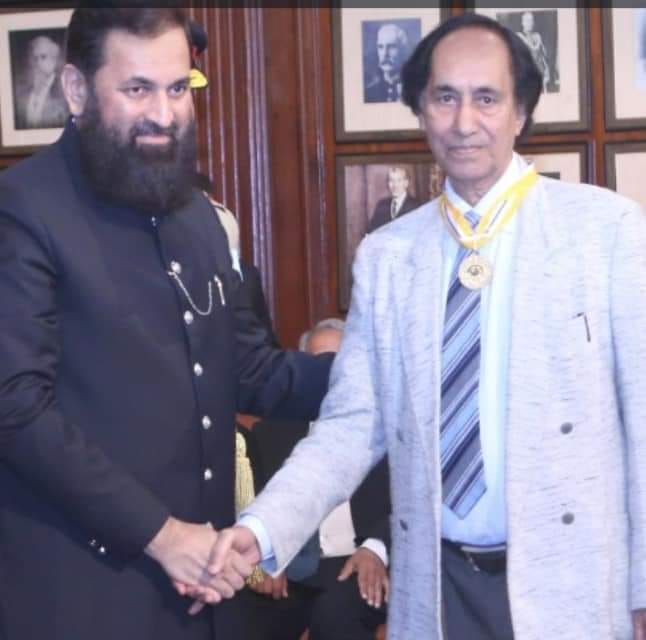Pakistan’s Nuclear Program and the Enduring Legacy of Shaheed Zulfikar Ali Bhutto
Pakistan’s Nuclear Program and the Enduring Legacy of Shaheed Zulfikar Ali Bhutto

Chaudhry Naveed
Coordinator PPP Digital UK
Pakistan’s Nuclear Program and the Enduring Legacy of Shaheed Zulfikar Ali Bhutto
Abstract:
This article explores the origins and development of Pakistan’s nuclear program, focusing on the pivotal role of Shaheed Zulfikar Ali Bhutto. As a visionary leader, Bhutto laid the foundation for Pakistan's strategic deterrence capability, navigating immense geopolitical and domestic challenges. His foresight, political will, and personal sacrifices were instrumental in transforming Pakistan into a nuclear-armed state, the first in the Muslim world.
Introduction
The emergence of Pakistan as a nuclear power in 1998 was not an overnight phenomenon but the result of decades of strategic planning, scientific development, and political will. Among the key architects of this transformation was Shaheed Zulfikar Ali Bhutto, who viewed nuclear capability as essential to Pakistan's survival in a hostile regional environment. His leadership during the foundational phase of the country’s nuclear program was instrumental in shaping the trajectory that led to the nuclear tests at Chagai.
Historical Context and Strategic Rationale
Following the traumatic dismemberment of Pakistan in the 1971 war and the creation of Bangladesh, the country faced an urgent need to reassert its strategic autonomy. The geopolitical imbalance with India, especially after India’s successful nuclear test in 1974, heightened Pakistan’s sense of vulnerability. Bhutto recognized that nuclear deterrence was critical to ensuring national security and regional stability.
His famous declaration, “We will eat grass, even go hungry, but we will get one of our own [a nuclear bomb],” became emblematic of his determination to acquire nuclear capability regardless of the cost.
The Multan Conference: A Strategic Turning Point
On January 20, 1972, barely a month after the 1971 war, Prime Minister Bhutto convened a meeting with top Pakistani scientists at Multan. There, he entrusted the Pakistan Atomic Energy Commission (PAEC) under Munir Ahmad Khan with the task of developing nuclear weapons. This conference is widely regarded as the formal launch of Pakistan’s nuclear program.
Bhutto emphasized self-reliance, national pride, and strategic necessity. It was under his direct political oversight that nuclear infrastructure was established, including research centers and uranium enrichment facilities.
Scientific Development and Dr. A.Q. Khan’s Role
In 1976, Bhutto invited Dr. Abdul Qadeer Khan to join Pakistan’s nuclear program after he offered to assist using knowledge gained during his time with the URENCO uranium enrichment program in Europe. Bhutto swiftly established the Engineering Research Laboratories (later renamed Kahuta Research Laboratories), giving Dr. Khan the mandate to lead uranium enrichment.
The combination of PAEC’s plutonium-based efforts and Kahuta’s uranium enrichment project reflected Bhutto’s dual-track approach, aimed at ensuring success under severe resource and time constraints.
International Pressure and Diplomatic Defiance
Bhutto’s nuclear ambitions drew strong opposition from Western powers, particularly the United States. Diplomatic pressure, veiled threats, and economic coercion were applied to dissuade Pakistan from pursuing nuclear weapons. Nonetheless, Bhutto remained unwavering.
He exposed the double standards of the non-proliferation regime, often questioning why nuclear powers insisted on monopoly while denying others the same right to self-defense. His firm stance on nuclear sovereignty earned both admiration and antagonism internationally.
Downfall and Martyrdom
In 1977, General Zia-ul-Haq staged a military coup and overthrew Bhutto’s government. The new regime sought to dismantle Bhutto’s political legacy, and he was controversially tried and hanged in 1979. His execution was condemned internationally and is widely regarded as judicial murder.
Despite his removal, Bhutto’s nuclear policy endured. Scientists and institutions continued their work, and successive governments, including that of Benazir Bhutto, protected and advanced the program he initiated.
The Culmination: Chagai Tests of 1998
On May 28, 1998, Pakistan successfully conducted five nuclear tests in the Ras Koh Hills of Chagai, Balochistan, in response to India’s tests earlier that month. These tests were a culmination of Bhutto’s vision and validated his long-standing assertion that nuclear capability was central to Pakistan’s national security.
Prime Minister Nawaz Sharif, who authorized the tests, acknowledged the foundation laid by Zulfikar Ali Bhutto in his public addresses, affirming Bhutto’s place in history as the father of Pakistan’s nuclear program.
Conclusion
Shaheed Zulfikar Ali Bhutto’s vision, resolve, and sacrifices were instrumental in transforming Pakistan into a nuclear power. Despite his tragic downfall, his legacy lives on through a stronger, more secure Pakistan. His leadership during the formative years of the nuclear program not only redefined national defense but also positioned Pakistan as a significant player in global strategic affairs.
In honoring Bhutto’s legacy, Pakistan acknowledges that the pursuit of scientific advancement and strategic autonomy must be grounded in courage, foresight, and an unwavering commitment to national dignity.


No comments yet.